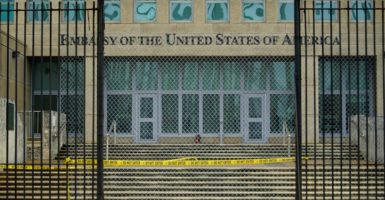In withdrawing personnel from the U.S. Embassy in Cuba, the Trump administration took a limited and reasonable retaliation for attacks on U.S. diplomats in Havana. It could, and should, have gone further, but the actions at least convey to the ruthless Castro regime that it now deals with a government that will stand up for U.S. interests.
The withdrawal will affect over 50 percent of the diplomatic personnel at the U.S. Embassy in Havana considered “nonessential.” It comes weeks after the State Department announced that at least 21 American diplomats—it is thought to be more—have been harmed with loss of hearing and minor brain injury.
The cause is thought to be acoustic attacks aimed at diplomatic compounds or even the living quarters of U.S. personnel. Such attacks were routine during the decades when the U.S. and the West faced off with the Communist empire based in the Soviet Union.
That state disappeared and its Eastern European client states are now free and democratic, but Cuba, once also a Soviet protégé, continues to be communist and heavily repressed. Agents of the regime have long harassed American diplomats based at the embassy, and before the Obama administration reopened it in 2015, at the U.S. interest section that was in Havana for decades.
In addition to the withdrawal of nonessential personnel, the State Department also stopped issuing visas to Cuban nationals and warned Americans not to travel to Cuba.
The KGB-trained senior officials of Gen. Raul Castro’s regime criticized the actions as “hasty” and even the Obama deputy whom they out-negotiated during months of secret meetings, Ben Rhodes, seemed to side with them in a rueful tweet:
Goal of whoever is behind attacks seems to be sabotaging US-Cuba relations. Would be a shame if they succeed. Cuban people wld suffer most https://t.co/CkEn4fTMqu
— Ben Rhodes (@brhodes) September 29, 2017
Rhodes, a former fiction writer hired by President Barack Obama to handle diplomatic skulduggery from Cuba to Burma, always says he’s acting in the interests of Cuban people. But earlier this year he defended his boss’ decision to no longer accept Cubans who arrived by sea by writing in the Atlantic that letting them in ”robbed Cuba of young people.” So if it’s up to him, Cubans must stay slaving away in the Castros’ 21st century version of the salt mines.
In reality, the Castro regime has refused to guarantee the safety of U.S. personnel. It has not cooperated with the United States nor indicated who carried out the attacks, if indeed it wasn’t the regime.
Secretary of State Rex Tillerson should have downgraded U.S. relations with the Castros and changed the embassy back to an interest section. He also could have ordered an equal number of Cuban officials to leave Washington. The Castros clearly violated the terms of the Vienna Convention that regulate the treatment of diplomatic personnel.
President Donald Trump announced earlier this year that he would undo much of the Obama administration’s opening to the regime, but until now not much had happened. The Castro family has run Cuba, once a thriving and wealthy island, since 1959, the longest running dictatorship in the Western Hemisphere by several decades.
Hopefully now that he sees what the Castros are capable of, he will ratchet up the pressure. “Some very bad things happened in Cuba,” Trump said on Friday. Yes, for 58 years.




























